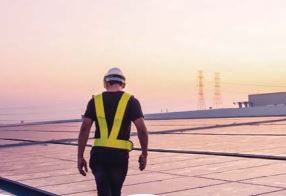
Environmental

As an important part of our unwavering commitment to act as a steward for the environment, we seek to minimize stc’s direct environmental impacts as well as any indirect impacts associated with the use of our products and services. We continue to support our customers in reducing their own environmental impacts and we are taking the necessary steps to ensure that we achieve our ultimate goal of reaching net- zero emissions by 2050.


stc has committed to reach net-zero emissions across the company’s entire value chain by 2050. We have incorporated this ultimate goal into our Group-wide climate change mitigation strategy, which is based on the Task Force for Climate-related Financial Disclosures (TCFD) and the Science-Based Targets initiative (SBTi) to ensure that we are accurately measuring our carbon reductions.
Our path to net-zero
Actions, achievements & ambitions
-
Joined the global movement of leading companies aligning their business with the Paris Agreement to reach net-zero emissions by no later than 2050, in line with the United Nations Framework Convention on Climate Change (UNFCCC) 1.5° C scenario
-
Committed to adopting science-based targets (SBTi)
- Identified carbon footprint and impact baselines
- Explored renewable energy options
- Signed first renewable energy pilot project contract for 17 sites across KSA
- Developed Scope 1 and Scope 2 emissions boundaries and baselines
- Developed a robust, detailed GHG inventory
- Achieved verified submission to the SBTi
- Improved company-wide emissions data management procedure
- Committed to planting 1 million trees
- Validated and approved stc’s net-zero and interim science-based 2030 targets by SBTi
- Participated in largest-ever voluntary carbon credit auction
- Participated in Saudi Green Initiative (SGI) Forum during COP28
- Reduce Scope 1 and 2 emissions by 50% and Scope 3 emissions by 46.2% from 2019 baseline in alignment with ≤ 1.5°C UNFCCC scenario
- Achieve net-zero emissions
-
-
Pillars
Optimizing stc’s performance
-
Objective
Promote continuity & quality of information, ensure carbon reduction commitments are achieved, and provide a foundation for improvement & system analysis
-
Programs
- GHG emissions governance
- Manage Scope 1 emissions
- Manage Scope 2 emissions
-
2023 Initiatives
- Improved energy efficiency of data centers
- Solar pilot project
- Solar installation in parking areas, buildings, and outlets
- Improved energy efficiency at tower sites
- Recycling program for network devices
- Implementation of “take back program”
-
-
-
Pillars
Developing eco-friendly products and solutions
-
Objective
Reduce the climate impact from materials, products, and services used by stc and across the company’s value chain
-
Programs
- Carbon enablement
- Sustainable customers
- Engaged supply chain
-
2023 Initiatives
- Sustainable products and services through stc Cloud, Iot squared, Solutions, and Specialized Emergency response products such as Tari
-
-
-
Pillars
Managing climate-related risks & financial impacts
-
Objective
Assess & manage climate-related risks in a manner that future-proofs stc Group’s operations and ensures alignment with stakeholder expectations
-
Programs
- Climate risk evaluation
- Climate resilient assets and services
-
2023 Initiatives
- Rigorous risk assessments guided by TCFD recommendations
- Developing Group-wide policies and processes
-
-
-
Pillars
Demonstrating climate leadership
-
Objective
Empower stc’s colleagues and supply chain to influence climate action at both the local and global scale
-
Programs
- Internal and external empowerment
- Implement circular economy considerations across supply chain
-
2023 Initiatives
- Recycling program
- ESG training program
- Internal capacity building
- GCC telco alliance and launch of GCC innovation hub
-
stc’s climate strategy establishes a clear, ambitious vision and measurable objectives for all Group departments and subsidiaries to consider as part of implementing all business practices going forward. In 2023, we solidified this climate strategy with a focus on four priority pillars for climate action. Each pillar is supported by science-based targets, KPIs, and Group-wide initiatives, complete with a detailed implementation plan for 2023 – 2030.
stc’s climate action is part of the larger Sustainability Roadmap, headed by the Sustainability General Manager and endorsed by the GCSO. It has been approved by the Sustainability Management Committee, chaired by the GCEO that reports to the board, which meets quarterly to oversee implementation progress and review relevant risks and targets. We have developed several internal regulations and policies designed to position stc Group to achieve climate change targets, including:
- Environmental Policy
- Sustainability Policy
- Sustainability Supply Chain Policy
- Supplier Code of Conduct
The environmental policy and sustainable supply chain policies are in the process of final top management approval to be launched and published soon.
In 2023, we analyzed climate-related risks in accordance with the TCFD, covering short-, medium, and long-term physical and transition-related risks. This comprehensive scenario assessment has allowed us to pinpoint the significant climate change risks and opportunities for stc’s Group-wide business operations. From this, we developed three distinct scenarios that cover the breadth of our climate risk assessment. These scenarios roughly correspond to public domain scenarios from IPCC, IEA, and NGFS, as indicated below:
- Scenario 1 - Business as usual:
- Scenario 2 - Delayed transition (20 scenario):
- Scenario 3 – Net-zero carbon transition (1.50 scenario)
| Category | Nature | Risk | Description | Assets | Financial impact | Time horizon
|
|||
|---|---|---|---|---|---|---|---|---|---|
| Physical | Acute | Extreme weather | Severe storms, hurricanes, or flooding impacts the infrastructure and disrupts services |  |
$$$$$ |
|
|||
| Physical | Acute | Changes in temp. & precipitation patterns | Changes in temperature and precipitation patterns impact telecommunication towers |  |
$$$$$ |
|
|||
| Physical | Chronic | Water scarcity and quality | Inefficient cooling systems and data centers leading to increased energy consumption and reduced cooling efficiency |  |
$$$ |
|
|||
| Physical | Chronic | Rising sea levels and storm surges | Damage from rising sea levels on coastal areas infrastructure leading to service disruptions and costly repairs. |  |
$$$$ |
|
|||
| Transitional | Policy and regulation | Policy and regulation changes | Increase of electricity price due to requirements for emission reductions, renewable energy adoption and energy efficiency standards. |  |
$$$$$ |
|
|||
| Transitional | Policy and regulation | Liability risks associated with the transition to a low-carbon economy | Requirements for minimum energy performance of buildings to ensure transition to Net Zero |  |
$$$$ |
|
|||
| Transitional | Technology | Technological innovation and disruption | Market moves away from reliance on fossil fuels for logistics and emergence of less carbon intensive practices |  |
$ |
|
|||
| Transitional | Market | Shifts in consumer preferences and behavior towards sustainable products and services | Consumers adopt more sustainable behavior and switches to lower carbon products and services |  |
$$ |
|
|||
| Transitional | Policy & regulation | GHG Emission cost | Introduction of carbon pricing in Saudi on direct emissions to incentivize emissions reductions |  |
$$$$$ |
|
|||
| Transitional | Policy & regulation | GHG Emission cost | Introduction of carbon tax in suppliers’ country resulting on a higher cost of operations for supplier companies |  |
$$$ |
|
|||
| Transitional | Market | Supply chain disruption and increasing material costs | Extreme weather events disrupt supply chain and procurement of materials |  |
$$$$ |
|
|||
| Transitional | Technology | Renewable Energy Adoption | Late adoption of renewable energy leads to higher energy cost for business activities |  |
$ |
|
| Assets |

Marine cables
|

Towers
|

Buildings
|

Logistics/ supply chain
|

Finance
|

Channels
|

Data centers
|
|---|---|---|---|---|---|---|---|
| Financial impact | $ | $$ | $$$ | $$$$ | $$$$$ | ||
| Time horizon |
< 2 years Short |
2-5 years Medium |
5-10 years Medium-Long term |
>10 long term |
stc has committed to a net-zero target by 2050, which encompasses Scope 1, 2, and 3 emissions in line with the goals of the Paris Agreement. Our near-term emission reduction targets have been validated by the SBTi.
stc Group has also committed to planting 1 million trees to help support nature-based carbon sequestration and increase local wildlife habitat. This is just one of many initiatives that the Group has launched to advance progress towards its environmental commitments.
Long-term targets and commitments
Overview of stc Group’s long-term public commitments and validated targets




Near-term goals by 2030 set in line with Science Based Targets
In 2023, stc adopted energy-efficient solutions in collaboration with one of our major partners, to further progress in reducing our carbon emissions and achieving our net-zero target. These solutions include, among others, space- and energy-efficient high-performance baseband processing and new SoC-based baseband plug-in cards that deliver nearly 10x more cells compared to previous generations, saving more than 800 MWh of energy and reducing CO2 emissions by more than 570 tons annually.
stc’s trade-in program allows customers to trade in or recycle their electronic devices to reduce clutter, protect the environment, and earn stc account credit. These devices are then cleaned-up, repackaged, and re-sold to other customers at an affordable price. As a result, we adjusted our target numbers and by the end of 2023 we collected, refurbished, and recycled 44,000 devices through this program.
At stc, we take an active role in managing energy consumption by promoting the use of digital solutions for our own business activities, as well as for those of our customers. stc Group utilizes big data analytics to deliver actionable insights and an alert system for energy consumption and optimization, which can be found in stc Campus and other specified sites. This new solution, implemented in 2023, avoids manual input for calculating energy consumption and automates results to save effort and ensure greater accuracy.
In 2023, stc Group recorded a 7.5% decrease in direct energy due to decrease in petrol and diesel consumption. However, total energy consumption increased by 10% due to increase in indirect energy. This is due to group expansion and we are implementing plans put in place to reduce overall energy consumption but the positive impact will evident in the short-term.
In Saudi Arabia, we completed Phase 3 construction on three next-generation cloudenabled data centers to add to the three already in service, for a total of six operational data centers in total during 2023. Our three new data centers received uptime certification for design, testing, and commissioning TIER-III standards and TCOS (Gold).
As photovoltaic (PV) technology advances and production costs decrease, we are incorporating more solar energy throughout our HQ premises. In 2023, we had seven installed operational solar powered sites at our headquarters in Riyadh, generating 180 kWh of output and a total capacity of 3.5 MW. Across stc Group, TAWAL has seen a 66% increase in solar powered sites in 2023 for an additional 1,335.77 MWh of renewable energy.
Energy optimization for data centers
Our data center operations embody a sustainability approach, integrating operations, policy, efficiency, and technological achievements into the design and procurement processes to ensure operational sustainability and policy alignment.
Our strategies focus on minimizing environmental impact while maintaining operational efficiency
As a result of these considerations, we are anticipating a 25%-30% improvement in PUE for new data centers in comparison to previous years after populating the new data centers.
stc towers in Saudi Arabia are managed by TAWAL, the region’s first and largest telecom tower company. Promoting energy efficiency is one of TAWAL’s strategic pillars with a focus on reducing energy consumption by promoting efficient energy solutions for more than 21,201 active towers in KSA and 5 other countries worldwide.
Our renewable energy pilot project aims to install solar photovoltaic (PV) systems within existing infrastructure found throughout KSA, including parking structures, warehouses, sales outlets, and other physical assets in the built environment. Initiated in 2021, the project is scheduled to be completed by 2024 and will help pave the way for new energy models to be incorporated within critical infrastructure while also reducing carbon emissions by an estimated 8000 metric tons annually, as well as generating over 14.2 GWh of annual green energy.

- Rooftops, parkings, buildings, data center, warehouse and outlet in Riyadh
- 7,643 PV panels
- 4,259 total installed (kW)
- 29,402 tCO2 , total emissions reduction
- Data centers and warehouses in Qassim, Makkah, Jeddah, Madinah, Dammam
- 7,804 PV panels
- 4,370 total installed (kW)
- 30,167 tCO2, total emissions reduction
- 18 sites
- 15,447 PV panels
- 8,629 total installed (kW)
- 14,238,708 kWh annually
- Approximately 8,088 tCo2 reduction annually
- 5,149,615 trees saved
At stc, we are committed to doing our part. We are setting ambitious targets and taking necessary actions to manage and reduce carbon emissions from our own operations and throughout our value chain. This includes an ambitious Group-wide target to achieve netzero emissions by 2050, guided by SBTi, which was validated in 2023, as well as the UNGC and the GSMA climate policy target.
As one of the first regional telecom operators to validate GHG targets through SBTi, stc has established a comprehensive climate strategy and implementation plan to manage and monitor climate performance, gain competitive advantages, benefit from innovative products, and accelerate climate action in the Gulf and MENA regions.
stc’s carbon footprint is calculated based on the international GHG Protocol Corporate Accounting and Reporting Standard. To offset emissions that could not be immediately reduced, we purchased verified, high-quality carbon credits from the Regional Voluntary Carbon Market Company (RVCMC) at the largest-ever voluntary carbon credit auction event held in Nairobi, Kenya.
We are working with peer companies in the ICT and telecom sectors to advance sustainability in the greater Gulf and MENA regions, with a specific focus on climate action and sharing knowledge.
In 2023, we continued to lead the GCC ESG Telecom Alliance. This pivotal collaboration among seven leading telecom companies in the Gulf region remains the first of its kind in the industry, and featured 120 attendees across all knowledge sessions during the past year.
To learn more about the Alliance, visit: GCCexecutive_report.pdf
Reforestation has a positive impact on climate change and plays a pivotal role in preserving and restoring biodiversity, which is why stc Group has committed to planting one million trees by 2030. The initiative aims to yield more than 25,000 tons of CO2e per year. In 2023, stc Bahrain, along with select partners, planted 35,000 trees across 50 sites and governorates, with an aim to plant 50,000 more trees in the next phase. stc Bahrain’s campaign “Trees for Life” was recognized at the International CSR Excellence Awards.
Water is a scarce and valuable resource, especially in the greater MENA region, and stc is particularly committed to increasing the efficiency of water use throughout all business operations. Overall, our consumption principally comes in the form of sanitation and airconditioning usage, as well as tankers for backup use. In 2023, several subsidiaries relocated to stc’s headquarters and many construction projects took place that involved renovation of entire buildings. In a concerted effort to proactively address water management issues, plans to construct a water treatment plant on stc’s main campus have been announced. The project will have a capacity of treating 250 cubic meters per day. It is planned to be completed by by the end of 2025.
As an integral part of our commitment to environmental responsibility, waste management is a crucial component of our sustainability strategy. Our operations fundamentally involve extensive use of electronic equipment, underscoring the importance of appropriate waste management practices. One of the most impactful initiatives that we have implemented is a recycling program across all stc buildings and sites, which empowers individuals to actively contribute to waste reduction. This, along with other smaller initiatives, resulted in a 6% reduction in waste generated in Saudi Arabia and 3% across stc Group in 2023.
In 2023, our network through TAWAL recorded 1,141 metric tons of waste generated from both network and operational maintenance waste, of which 71% was recycled. Additionally, TAWAL recorded a 96% drop in hazardous material disposed due to TAWAL’s battery replacement strategy and shifting from lead acid to Lithium.
Circular economy consideration across supply chain
As part of our initiative to standardize warehouse inventory management throughout our operations we have implemented the use of 100% biodegradable bags.
In 2023 and through our recycling program across supply chain, we collected 7,131 tons of waste. Of the total, almost 74% was reused, and 16% recycled, and the remaining portion was responsibly disposed of. All our e-waste recycling efforts undergo validation by the National Centre for Waste Management.
Another integral component of our circular economy considerations across supply chain is our trade-in program. The trade-in program encourages the return and reuse of mobile devices at the end of their life-cycle rather than disposing of them as waste.
Paperless work environment
We are committed to operating in a paper-less work environment. In 2023, we took our dedication to paperless operations a step further by rolling out a comprehensive paperless office policy.
As a result of our ongoing efforts to embrace digital transformation, we have digitized and automated over 77 group-wide processes and services on our internal platform intranet (stc Hub). This strategic initiative has not only streamlined our operations but also significantly reduced costs by 85%.



